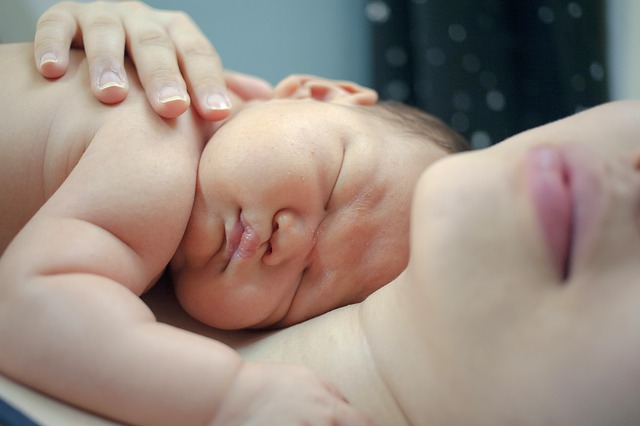
Vaginal bleeding and discharge after birth (known as lochia) is completely normal and should not generally be a cause for alarm. This is true whether you have a vaginal birth or a caesarean section as this is how the body gets rid of the blood and tissue from the womb that was needed during pregnancy.
This bleeding will normally be heaviest in the first few days after you give birth and then should decrease significantly after the first 10 days or so. Light bleeding may continue for up to around 6 weeks after birth.
If you continue to bleed heavily after the first few days, it may be a sign of a birth complications. Similarly, if you are bleeding very heavily, either immediately after birth or during the first 12 weeks following birth it may be a sign of postpartum haemorrhage, which affects around 1 in 20 new mothers. Postpartum haemorrhage is very serious and can result in death if not treated promptly.
Passing more than a pint of blood in the first 24 hours after giving birth should be seen as a danger sign for serious health complications, as should a large number of blood clots in the blood you are passing.
If you believe you may be bleeding abnormally after giving birth, you should seek immediate medical advice to make sure you get the right treatment as soon as possible where necessary.
What causes excessive bleeding after birth?
The most common cause of postpartum haemorrhage is a condition known as ‘uterine atony’. This is where the uterus does not contact as strongly as it normally should after delivery, which is essential to stop bleeding from the site where the placenta was attached to the lining of the womb. This can then lead to continuous bleeding from the womb lining, resulting in postpartum haemorrhage.
Other potential causes of worse than normal bleeding after birth include:
- Uterine rupture (where the uterus tears during birth)
- Vaginal tearing
- Cervical tearing
- Complications from a caesarean section
Excessive bleeding after birth may be the result of unavoidable complications during your child’s birth, but it could also be an indication that you have been the victim of a birth injury caused by medical negligence on the part of the team handling the birth. When birth injury results from malpractice, there are various forms of legal action one might wish to take in response to this happening. Someone who is in hospital for one medical emergency shouldn’t have to fear leaving the hospital with another. We entrust medical professionals quite literally with our lives because we understand the knowledge and expertise that they possess in the medical field is far superior to our own and so when a doctor commits a medical error, that trust is eroded and victims of negligence have the right to pursue legal action against those responsible.
What to do if you have suffered an injury while giving birth
If you were injured while giving birth due to negligence on the part of a doctor, midwife or other medical staff, you may be entitled to claim compensation. This can be used to pay for medical treatment and counselling, replace lost income, compensate you for your pain and suffering, as well as covering other financial and non-financial consequences of your injury.
Claiming compensation for a birth injury to a mother can be high complicated, however, so it is important to have the right legal advice and support from the outset. This can ensure all the right evidence is collected and that your case is built and presented in the right way to give you best chance of securing fair compensation.

I can totally relate to this article. About 6 weeks after having my son via c-section I began to have these huge clots. It was the scariest thing ever. The ambulance came and wanted to take me to the ER but I made my husband take me to my gynocologist where she did a procedure in her office. Its so scary being a mom for the first time and discovering things and info you never knew. That was 25 years ago.